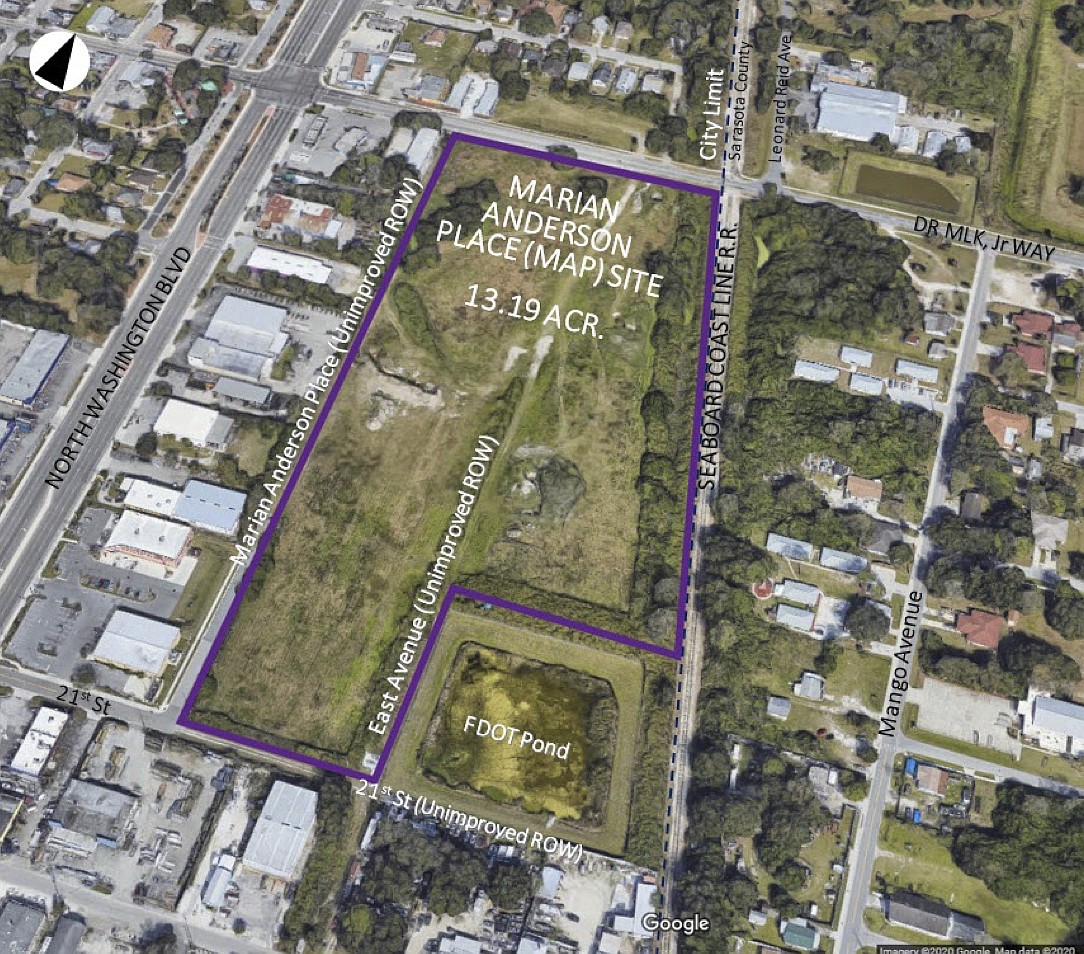- April 25, 2024
-
-
Loading

Loading

For decades, a 13.1-acre swath of environmentally damaged land in north Sarasota has sat vacant despite repeated efforts to use the property to spur economic development in the area.
On Monday, the City Commission took another step toward revitalizing the Marian Anderson Place site, located just east of U.S. 301 on Dr. Martin Luther King Jr. Way. The board voted unanimously to advance negotiations with a private development group interested in building a warehouse and offices on the city-owned land.
The group behind the unsolicited development proposal, called Newtown Gateway, is led by Miami-based Woodwater Investments and Sarasota-based 3D Map Developers. At Monday’s meeting, Woodwater CEO Barron Channer said the group possessed both experience navigating the challenges of brownfield sites and local knowledge that would drive neighborhood trust in a potential development.
“One thing unquestioned about us is we have a commitment to the project and to the community,” Channer said. “That’s going to matter if times get tough.”
The city purchased the Marian Anderson Place site in 1944 for $10, using the land as an unlicensed landfill until the 1960s. When the city explored developing the land in the early 2000s, a series of environmental assessments showed elevated levels of arsenic, lead, pesticides and more in the soil, according to a staff report.
In a quest to overcome the city’s environmental issues, officials sought a public-private development partnership but failed to produce an actual project. A 2006 proposal for a Walmart fell through after follow-up testing on the site. A 2011 search for prospective developers found no interested parties. In 2017, the city put out another invitation to negotiate, and one developer submitted a proposal for a mixed-use project centered on a vocational school. Again, after gathering more detailed cost estimates, the developer decided not to proceed.
In late 2020, the city received two unsolicited development proposals for the land. A staff review favored the Newtown Gateway plan, which includes a 96,000-square-foot warehouse, a 51,600-square-foot office complex and a 45,000-square-foot medical site. Channer said the project was designed to provide benefits for the community and the city, generate jobs and, in the case of the medical facility, provide services for people in the neighborhood. The presentation said the developer would take steps to target local hires.
The initial proposal called for the city to sell the land for a transfer fee of $10,000, the reduced price a reflection of the investment necessary to address issues with the site. In 2021, the Sarasota County Property Appraiser values the land at $548,200.
The presentation at Monday’s meeting featured a breakdown of expected costs. The developer estimated the overall expenses would total $37 million, including $4.35 million for soil remediation.
Even if the city approves a partnership, and the project proceeds on the developer’s preliminary schedule, it could take nearly five years to complete construction. The presentation suggested it would take more than a year to do preliminary work, including conducting additional due diligence on the conditions of the site, conducting a sale, planning the soil remediation and securing the necessary entitlements from the city to allow the project to proceed. From there, the team envisions constructing the project in phases, with the medical facility completed in just more than three years and the office portion wrapping up in just under five years.
At the conclusion of Monday’s meeting, the board directed staff to proceed with discussions about a more formal land-use agreement for the commission to consider at a later date.
Commissioner Jen Ahearn-Koch said there was still uncertainty about the ultimate cost of remediating environmental issues, and she asked how higher-than-anticipated costs might affect the feasibility of developing the site.
“I saw (land remediation) is 12% of your overall construction budget,” Ahearn-Koch asked. “What if you start touching the land, and it turns out that number is going to be double?”
Channer said the development team had a variety of potential resources at its disposal if such a situation arose, including securing grants and adjusting the makeup of the project to increase revenue generation. Channer also acknowledged that, as a private investor, some level of uncertainty is baked a project such as this.
“We’re business people, and we’re prepared to take some financial risk,” Channer said.